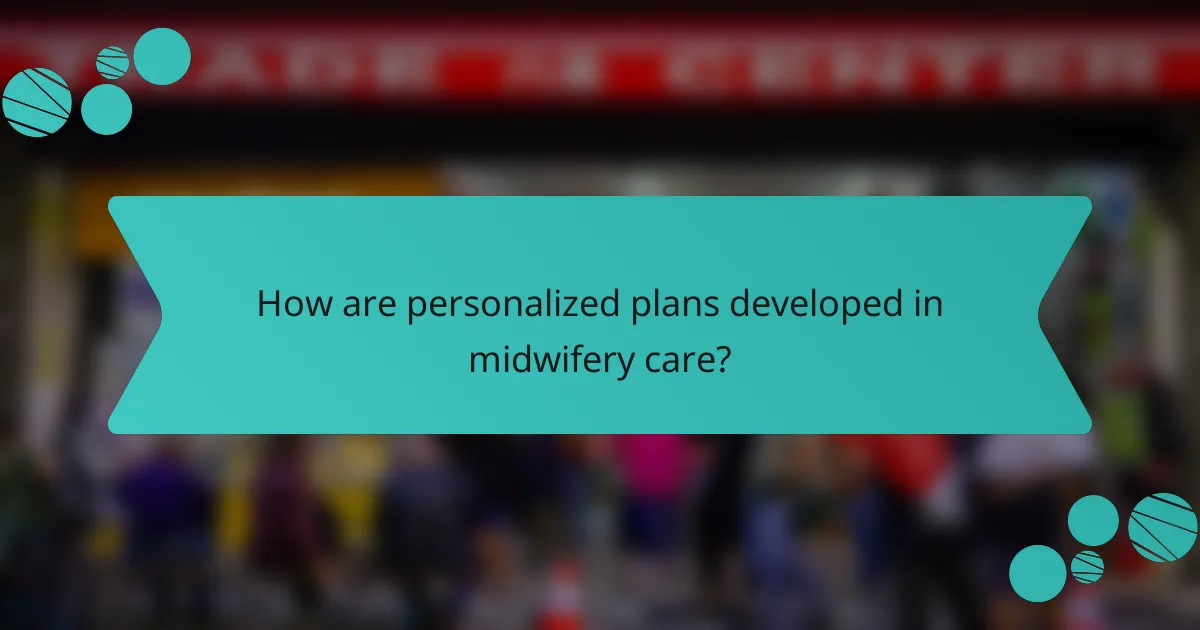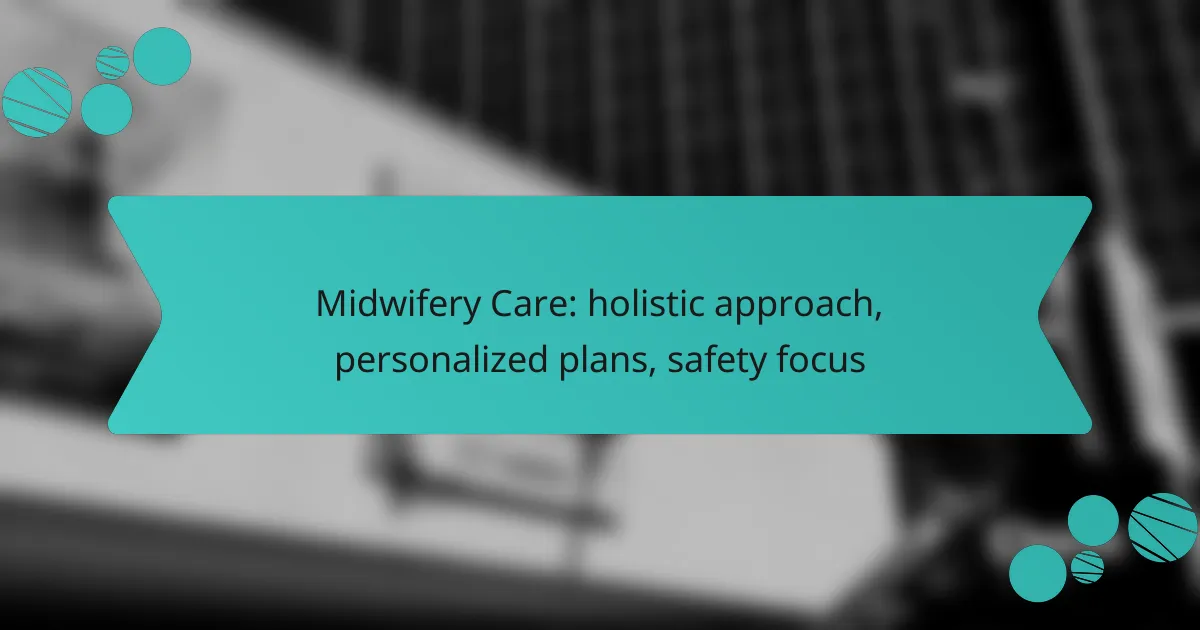Midwifery care offers a holistic approach to pregnancy, childbirth, and postpartum support, prioritizing the physical, emotional, and social well-being of both mother and baby. By creating personalized birth plans and emphasizing safety through comprehensive protocols, midwives ensure that each woman’s unique needs are met throughout the perinatal period.

What is midwifery care?
Midwifery care is a holistic approach to pregnancy, childbirth, and postpartum support, focusing on the physical, emotional, and social well-being of the mother and baby. This type of care emphasizes personalized birth plans and safety, ensuring that each woman’s unique needs are met throughout the perinatal period.
Definition of midwifery care
Midwifery care involves the support and management of pregnancy, labor, and the postpartum period by trained professionals known as midwives. Midwives provide comprehensive care that includes prenatal check-ups, labor support, and postnatal follow-ups, often in a home or community setting.
This care model prioritizes informed decision-making and encourages women to actively participate in their birthing experience. Midwives are trained to recognize complications and collaborate with obstetricians when necessary, ensuring safety while promoting a natural birthing process.
History of midwifery care
The practice of midwifery dates back thousands of years, with evidence of midwives assisting in childbirth found in ancient civilizations such as Egypt and Greece. Historically, midwives were often the primary caregivers for pregnant women, providing support based on traditional knowledge and community practices.

How does midwifery care ensure safety?
Midwifery care prioritizes safety through comprehensive protocols, continuous monitoring, and a focus on personalized care plans. By integrating evidence-based practices and maintaining open communication, midwives create a safe environment for both mothers and infants throughout the childbirth process.
Safety protocols in midwifery
Safety protocols in midwifery include routine assessments of maternal and fetal health, adherence to hygiene standards, and the use of evidence-based guidelines during labor and delivery. Midwives are trained to recognize early warning signs of complications, ensuring timely interventions when necessary.
Common safety measures involve monitoring vital signs, fetal heart rate, and labor progress. Midwives often collaborate with obstetricians and healthcare teams to ensure that all safety protocols align with local regulations and best practices.
Emergency procedures in midwifery
Emergency procedures in midwifery are critical for addressing unexpected complications during childbirth. Midwives are trained to perform interventions such as resuscitation, managing postpartum hemorrhage, and facilitating emergency transfers to hospitals when needed.
In case of an emergency, midwives follow established protocols which may include administering medications, using specialized equipment, or initiating advanced life support techniques. Regular training and simulation exercises help ensure that midwives are prepared to act swiftly and effectively in high-pressure situations.

What are the benefits of a holistic approach in midwifery?
A holistic approach in midwifery emphasizes the well-being of the whole person, addressing physical, emotional, and social factors during pregnancy and childbirth. This method fosters personalized care plans that enhance safety and improve overall outcomes for mothers and babies.
Physical benefits of holistic midwifery
Holistic midwifery promotes physical health by integrating various practices such as nutrition, exercise, and alternative therapies. These elements can lead to reduced complications during pregnancy and labor, as well as quicker recovery times postpartum.
For instance, incorporating prenatal yoga can help improve flexibility and strength, while proper nutrition can support fetal development. Regular check-ups and monitoring ensure that both mother and baby remain healthy throughout the pregnancy journey.
Mental health benefits of holistic midwifery
The mental health benefits of holistic midwifery are significant, as this approach recognizes the emotional aspects of pregnancy and childbirth. By providing a supportive environment, midwives can help alleviate anxiety and stress, which are common during this time.
Techniques such as mindfulness, counseling, and support groups can enhance emotional resilience. This focus on mental well-being can lead to improved bonding between mother and baby, fostering a positive postpartum experience.

How are personalized plans developed in midwifery care?
Personalized plans in midwifery care are developed through a collaborative process that considers the individual needs and circumstances of each patient. This approach ensures that care is tailored to support the unique physical, emotional, and social aspects of pregnancy and childbirth.
Assessment process for personalized plans
The assessment process for personalized plans begins with a comprehensive evaluation of the patient’s medical history, current health status, and lifestyle factors. Midwives conduct physical examinations, review lab results, and discuss any previous pregnancy experiences to gather essential information.
Following the initial assessment, midwives may use standardized tools and questionnaires to identify specific needs and preferences. This thorough evaluation helps in crafting a care plan that aligns with the patient’s health goals and expectations.
Incorporating patient preferences in care plans
Incorporating patient preferences into care plans is crucial for ensuring satisfaction and adherence to the proposed approach. Midwives engage patients in discussions about their values, beliefs, and desired birth experiences, which can significantly influence decision-making.
For example, if a patient prefers a natural birth without medication, the midwife will adjust the care plan to include pain management techniques such as breathing exercises or water immersion. Regular check-ins and open communication are essential to adapt the plan as the pregnancy progresses and preferences may evolve.

What are the costs associated with midwifery care?
The costs of midwifery care can vary significantly based on location, services provided, and whether the care is received in a home or hospital setting. Generally, families can expect to pay anywhere from a few thousand to over ten thousand dollars for comprehensive midwifery services, depending on their specific needs and circumstances.
Average costs of midwifery services
On average, midwifery services in the United States can range from approximately $3,000 to $8,000 for a complete package that includes prenatal visits, labor support, and postpartum care. In some cases, costs may exceed this range if additional services, such as specialized care or extended postpartum support, are required.
In Europe, costs can vary widely by country. For instance, in the UK, midwifery care is often provided through the National Health Service (NHS) at no direct cost to the patient, while private midwifery services may range from £2,000 to £5,000. In contrast, countries like Germany may see costs between €3,000 and €6,000 for private midwifery care.
Insurance coverage for midwifery care
Insurance coverage for midwifery care varies by provider and plan. Many health insurance policies in the U.S. cover midwifery services, especially if the midwife is a certified nurse-midwife (CNM). It’s essential to check with your insurance company to understand the specifics of your coverage, including any deductibles or co-pays that may apply.
In some countries, such as Canada, midwifery care is covered under provincial health plans, making it accessible without direct costs to the patient. However, in other regions, families may need to pay out-of-pocket or seek supplemental insurance to cover midwifery services. Always verify the details with your insurance provider to avoid unexpected expenses.

How to choose a midwife in major US cities?
Choosing a midwife in major US cities involves assessing qualifications, experience, and compatibility with your birth plan. It’s essential to consider local regulations and the midwife’s approach to care to ensure a safe and personalized experience.
Factors to consider when selecting a midwife
Start by checking the midwife’s credentials, including certification and licensure, which vary by state. Look for midwives who are certified nurse-midwives (CNMs) or licensed midwives (LMs), as these titles indicate formal training and adherence to safety standards.
Next, evaluate their experience, particularly with your specific needs, such as home births or high-risk pregnancies. Consider the midwife’s philosophy on birth, including their approach to pain management and interventions, to ensure it aligns with your preferences.
Lastly, assess the midwife’s availability and support network. A good midwife should have a plan for emergencies and collaborate with obstetricians and hospitals if complications arise.
Questions to ask potential midwives
When interviewing potential midwives, ask about their experience with births similar to yours. Inquire about their typical birth practices, including how they handle complications and their approach to prenatal and postpartum care.
It’s also crucial to discuss their availability during labor and delivery. Confirm whether they will be the one attending your birth or if another midwife may step in. Additionally, ask about their backup plans in case of emergencies.
Finally, discuss costs and payment options, as midwifery services can vary widely in price. Ensure you understand what is included in their fees and whether they accept insurance or offer payment plans.

What are the latest trends in midwifery care?
The latest trends in midwifery care emphasize a holistic approach, personalized birth plans, and a strong focus on safety. These trends reflect a growing recognition of the diverse needs of expectant mothers and the importance of tailored care throughout the pregnancy and birthing process.
Holistic Approach
A holistic approach in midwifery care considers the physical, emotional, and social aspects of a woman’s experience during pregnancy and childbirth. This method encourages midwives to engage with clients on multiple levels, fostering a supportive environment that promotes overall well-being.
Practitioners often incorporate complementary therapies such as acupuncture, massage, and nutritional counseling to enhance physical health and emotional resilience. This comprehensive care model can lead to improved maternal satisfaction and outcomes.
Personalized Plans
Personalized birth plans are becoming increasingly common in midwifery care, allowing expectant mothers to express their preferences and values regarding labor and delivery. These plans are developed collaboratively between the midwife and the client, ensuring that individual needs are prioritized.
Midwives may consider factors like previous birth experiences, medical history, and personal preferences when creating these plans. This tailored approach can enhance the birthing experience, making it more aligned with the mother’s desires and comfort levels.
Safety Focus
Safety remains a top priority in midwifery care, with practitioners adhering to established guidelines and protocols to minimize risks during pregnancy and childbirth. Midwives are trained to recognize potential complications and respond effectively, ensuring the well-being of both mother and baby.
Regular monitoring and assessments throughout pregnancy help identify any issues early on. Additionally, midwives often collaborate with obstetricians and other healthcare providers to ensure a seamless transition to hospital care if needed, maintaining a strong safety net for their clients.
